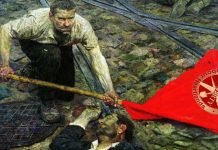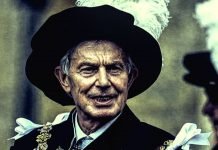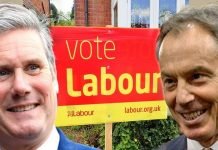The EEC and the Single European Act
The Conservative Prime Minister, Edward Heath, took the UK into the EEC in January 1973 after President de Gaulle of France had blocked UK membership twice in the 1960s. This brought EEC membership to nine. In a referendum in 1975 the UK electorate voted to stay in the EEC under renegotiated terms of entry.
The first major Treaty change was the Single European Act, which created an internal market with voting by qualified majority (QMV) rather than unanimity. The Single Market was established at the end of 1992. It allowed over 280 pieces of legislation to be passed, paving the way for common EU laws based on the principle of mutual recognition among Member States.
Britain and the EEC
In 1961 Britain applied for membership of the EEC. This was vetoed by French President Charles de Gaulle, who was concerned that British membership would weaken the French voice within Europe. He also feared that close Anglo-American relations would lead to the United States increasing its influence in Europe. Charles de Gaulle also vetoed a second application from Britain in 1969.
Britain joins the EEC
Denmark, Ireland and Britain joined the EEC in 1973, after Charles de Gaulle’s resignation in 1969.
Labour hold the first referendum on the EEC and campaigned to leave.
Under the Labour Prime Minister, Harold Wilson, there was a UK referendum on continued membership of the EEC in 1975. The electorate voted ‘Yes’ by 67.2% to 32.8% to stay in Europe.
Labour Remainers Infiltrated
The Labour Remain group had allowed itself to be run by Alistair McAlpine, treasurer of the “Yes” campaign, later Treasurer of the Tory Party.
Alistair McAlpine portrayed Labour’s opponents of Europe – Michael Foot, Tony Benn, Barbara Castle and Peter Shore among them – as “dangerous people” who were “virtually Marxist”.
Surprisingly Alistair McAlpine enthusiastically became a member of Sir James Goldsmith’s Referendum Party.
In 1994, the Anglo-French billionaire and MEP, Sir James Goldsmith, launched The Referendum Party, the most ambitious political campaign of modern times. Its aim was to secure for the British people the right to vote on leaving the European Union. He asked Patrick Robertson to put his plans into action.
In the run-up to the 1997 general election, The Referendum Party, under Patrick’s direction, created from scratch a national political organisation capable of fighting an election against the established political parties on a single issue: Britain’s membership of the European Union.
Chaired by former Conservative Party treasurer, Lord McAlpine, and led by Sir James, the party recruited and trained 547 parliamentary candidates and 180 political agents, opened ten regional offices served by a fully staffed HQ at Westminster, and signed-up more than 160,000 registered supporters. The Referendum Party’s £35 million media campaign, launched in 1996, produced twenty-five million copies of the newspaper “Referendum Now” posted to every household in Britain, six million copies of a compelling video called “The Most Important Video You’ll Ever Watch”, and the biggest media advertising campaign of any political party. On the eve of the election, The Referendum Party held a rally of 12,000 supporters at Alexandra Palace, the largest political gathering of any party since the war.
The historic achievement of Sir James Goldsmith’s Referendum Party was to secure, before the 1997 election, a cast-iron commitment from the main political parties to hold a binding referendum before joining the Euro. That promise protected British independence until the referendum campaign of 2016. Among political commentators there is wide agreement that this promise would never have been given but for the threat posed by the Referendum Party whose actions profoundly changed the direction of British politics. In the long term, the Party’s legacy was to provide the educational foundation, training and organisation for a generation of committed Eurosceptic campaigners, many of whom went on to make important contributions to the success of the Leave campaign in June 2016.
Sir James, who had been bravely battling cancer, died a few weeks after the 1997 election.
Sir James Goldsmith on Campaign in 1997 (AP Archive)
McAlpine was made a life peer in the 1984 New Year Honours, taking the title Baron McAlpine of West Green, of West Green in the County of Hampshire.
Defamatory allegations of child abuse
McAlpine Would later feel the weight of the media towards the end of his life.
In November 2012, McAlpine was falsely implicated in the North Wales child abuse scandal, after the BBC Newsnight programme accused an unnamed “senior Conservative” of abuse. McAlpine was widely rumoured on Twitter and other social media platforms to be the person in question. After The Guardian reported that the accusations were the result of mistaken identity, McAlpine issued a strong denial that he was in any way involved.[39] The accuser, a former care home resident, unreservedly apologised after seeing a photograph of McAlpine and realising that he had been mistaken, leading to a report in The Daily Telegraph that the BBC was “in chaos”.[40] The BBC also then apologised.
The decision to broadcast the Newsnight report without contacting McAlpine first led to further criticism of the BBC, and to the resignation of its Director-General, George Entwistle. The BBC subsequently paid McAlpine £185,000 in damages plus costs, which he donated to charity. He also won £125,000 in damages plus costs from ITV following a November 2012 edition of This Morning which linked Conservative politicians to allegations of child sex abuse, again donating the damages to charity.
European Monetary System
The European Monetary System (EMS) was created in 1979 to try and bring about currency stability throughout Europe by encouraging countries to co-ordinate their monetary policies. It used an Exchange Rate Mechanism (ERM) to create stable exchange rates in order to improve trade between Member States and thus help the development of the single market. This laid the foundations for a single European currency. Britain was the only EEC Member State not to join the ERM.
Budget Rebate
Britain, under the leadership of Margaret Thatcher, negotiated an EU budget rebate in 1984 after threatening to halt payments to the EU budget. Britain felt it was being unfairly treated as, despite being the third poorest EC Member State, it was set to become the biggest net contributor. This was largely due to farming subsidies, to which Britain was eligible for very little. The Fontainebleau Summit agreed that this was unfair and granted Britain a rebate.
Single European Act
The Single European Act (SEA) 1987 amended the Treaty of Rome. Its aim was to create a single internal market, which had been proving difficult under the existing Treaties. The SEA replaced many unanimous decision-making processes with Qualified Majority Voting (QMV), in order to facilitate the adoption of a raft of EU legislation by the end of 1992.
The Coming of the EU and the Maastricht treaty.
Jeremy Corbyn voted against the Maastricht Treaty that created the EU. Here’s what he had to say about it —
It takes us in the opposite direction of an unelected legislative body—the Commission—and, in the case of foreign policy, a policy Commission that will be, in effect, imposing foreign policy on nation states that have fought for their own democratic accountability.
Jeremy Corbyn predicted that the formation Euro would lead to the imposition of a “bankers’ Europe” on its members, according to parliamentary records.
Ahead of the 1993 adoption of the EU’s founding Maastricht Treaty Mr Corbyn warned that the creation of the currency’s European Central Bank would undermine European countries’ ability to set their own policy.
The whole basis of the Maastricht treaty is the establishment of a European Central Bank, which is staffed by bankers, independent of national governments and national economic policies, and whose sole policy is the maintenance of price stability,” he said.
That will undermine any social objective that any Labour Government in the United Kingdom—or any other Government—would wish to carry out.
Support Independent Journalism Today
Our unwavering dedication is to provide you with unbiased news, diverse perspectives, and insightful opinions. We're on a mission to ensure that those in positions of power are held accountable for their actions, but we can't do it alone. Labour Heartlands is primarily funded by me, Paul Knaggs, and by the generous contributions of readers like you. Your donations keep us going and help us uphold the principles of independent journalism. Join us in our quest for truth, transparency, and accountability – donate today and be a part of our mission!
Like everyone else, we're facing challenges, and we need your help to stay online and continue providing crucial journalism. Every contribution, no matter how small, goes a long way in helping us thrive. By becoming one of our donors, you become a vital part of our mission to uncover the truth and uphold the values of democracy.
While we maintain our independence from political affiliations, we stand united against corruption, injustice, and the erosion of free speech, truth, and democracy. We believe in the power of accurate information in a democracy, and we consider facts non-negotiable.
Your support, no matter the amount, can make a significant impact. Together, we can make a difference and continue our journey toward a more informed and just society.
Thank you for supporting Labour Heartlands












